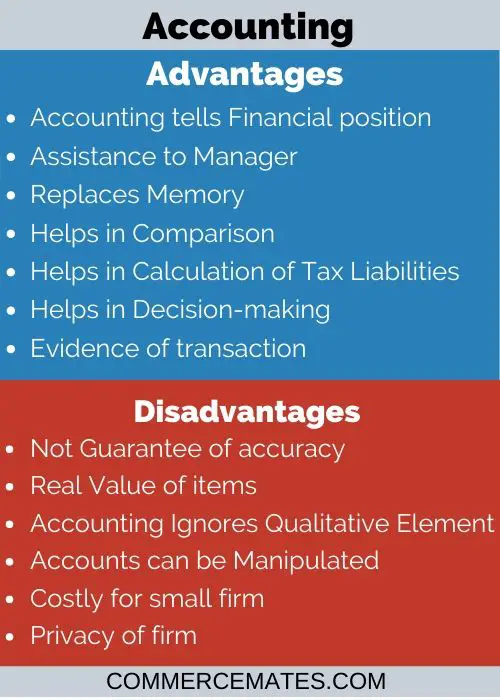Contents
Concept of Accounting
American Institute of Certified Public Accountants (AICPA) defines accounting as:
Accounting is the art of recording, classifying, and summarizing in a significant manner and in terms of money, transactions, and events which are, in part at least of financial character, and interpreting the results thereof.
Accounting is concerned with the recording of financial transactions, then classifying, and summarizing those transactions and communicate the financial information to users.

Advantages of Accounting
- Accounting tells Financial position: Accounting tells the financial position of the business. Financial performance during the last year and performance can be compared with the other firms.
- Assistance to Manager: Account provides the necessary data to the managers in the form of profit & loss account and balance sheet that helps in decision making.
- Replaces Memory: Accounting records all the transactions in a systematic and timely manner. If we need the information in the future we can easily find the information in accounting books.
- Helps in Comparison: Accounting format for different businesses is the same so we can compare our organization performance with other organizations’ performance. we can also compare our performance with last year’s performance.
- Helps in Calculation of Tax Liabilities: Profit & loss account provides the current year profit so that we can easily calculate the tax liability.
- Helps in Decision-making: Accounting helps in taking decisions for the growth of the business. these decisions can be selecting the price of the product or checking over employee expenses.
- Evidence of transaction: All the transactions are recorded and we can use the account as evidence if something wrong happened with the business.
Disadvantages of Accounting
- Not Guarantee of accuracy: Accounting recorded all the financial transactions with the past value. It does not consider the real value or market value of assets & liabilities. The values can be manipulated easily.
- Real Value of items: The financial account does not show the real value of assets. It shows the past value of assets. Depreciation can be charged by any method and any rate.
- Accounting Ignores Qualitative Element: It recorded all the financial transaction which are in the monetary form. but do not consider emotion, staff, relations, and public relations.
- Accounts can be Manipulated: Manipulation of Accounts for Avoiding tax and to show a false position to investors. By making small changes in account the financial statement can be manipulated.
- Costly for small firm: Small firm does not have lots of finance so, making proper account and audit it from a chartered accountant very costly for them
- Privacy of firm: There is no privacy for those who prepare accounts as it has to show to the general public including your competitors.